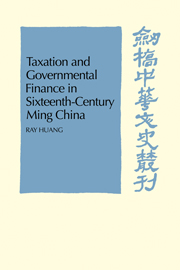Book contents
- Frontmatter
- Contents
- List of figures
- List of tables
- Preface by D. C. Twitchett
- Acknowledgements
- A note on weights and measures
- The Ming emperors
- Map of Ming provinces
- 1 Fiscal organization and general practices
- 2 The heritage of the sixteenth century and major fiscal problems
- 3 The land tax—(i) Tax structure
- 4 The land tax—(ii) Tax administration
- 5 The salt monopoly
- 6 Miscellaneous incomes
- 7 Financial management
- 8 Concluding observations
- List of abbreviations
- Appendixes
- Notes to the text
- Bibliography
- Glossary index
- General index
- Frontmatter
- Contents
- List of figures
- List of tables
- Preface by D. C. Twitchett
- Acknowledgements
- A note on weights and measures
- The Ming emperors
- Map of Ming provinces
- 1 Fiscal organization and general practices
- 2 The heritage of the sixteenth century and major fiscal problems
- 3 The land tax—(i) Tax structure
- 4 The land tax—(ii) Tax administration
- 5 The salt monopoly
- 6 Miscellaneous incomes
- 7 Financial management
- 8 Concluding observations
- List of abbreviations
- Appendixes
- Notes to the text
- Bibliography
- Glossary index
- General index
Summary
The miscellaneous incomes described in this chapter and in Table 15 comprise all state revenues other than the land taxes and the salt revenue. Though in describing any other fiscal system it might seem absurd to group together such items as the maritime tariff and the incense fees collected from the worshippers at national shrines, the revenue from government mining and the kitchen expenses account of the court of imperial entertainments, this curious sort of classification does reflect the style of the Ming fiscal administration. Governmental finance in the sixteenth century did not come to terms with the general economic trends of the times. The fiscal apparatus was too rigidly constructed to be able to exploit effectively the possibility of generating staple revenues from industry and commerce; it merely clung instead to a number of administrative incomes and what might be termed ‘nuisance taxes’. It was easier to continue to collect revenues from these sources because they were closely connected with the existing governmental organization. Though the income produced from such sources was limited, or even marginal, it was assured, and therefore played a larger part in state finances than did revenues from the more modern sector of the economy.
As these anomalies are matters of historical fact they leave the financial historian little choice in his ordering of the subject.
- Type
- Chapter
- Information
- Publisher: Cambridge University PressPrint publication year: 1975



